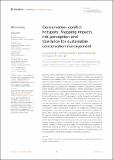Conservation conflict hotspots : mapping impacts, risk perception and tolerance for sustainable conservation management
Abstract
Global processes manifesting as activities in local places have led to an increase in documented conservation conflicts. Conservation conflicts are sometimes labelled human-wildlife conflict, focusing only on the direct negative impact of species (usually wildlife) on humans or vice versa. However, many authors now recognize that conservation conflicts arise between people with diverse views, when one party acts against the interests of another. They are thus human-human conflicts and not merely an impact on or from conservation. Conflict is not always directly correlated with impact because perceptions of risk, levels of tolerance and conservation values influence human responses. This review aims to define the concept of ‘conservation conflict hotspots’ and explore its practical applications in conservation. We propose that the interaction of impact, risk perception, level of tolerance in a context of conservation values can be mapped at a local scale, with spatial visualization assisting the prediction, understanding and management of such hotspots. The term conservation value incorporates measures of indigeneity, endemicity and demography along with emotional or cultural attachment to species or places. The umbrella terms of risk perception and tolerance capture many of the aspects of attitude, values and individual demographics that can influence people’s actions, enabling contextualization of relevant social factors at local scales. Spatially mapped layers enable us to plan and target conservation efforts towards human as well as ecological factors. The concept of ‘conservation conflict hotspot’ emphasizes the need for transdisciplinary research to understand underlying drivers of conflict and for dialogical and peace-building approaches to facilitate trust and cooperation amongst actors. We can thus address conflicts and achieve sustainable outcomes.
Citation
Lecuyer , L , Calmé , S , Schmook , B & White , R M 2022 , ' Conservation conflict hotspots : mapping impacts, risk perception and tolerance for sustainable conservation management ' , Frontiers in Conservation Science , vol. 3 , 909908 . https://doi.org/10.3389/fcosc.2022.909908
Publication
Frontiers in Conservation Science
Status
Peer reviewed
ISSN
2673-611XType
Journal item
Description
Funding: LL received a grant of excellence for foreigners from the Secretariat of External Relations of the Mexican Government; SC would like to thank the University of Sherbrooke for a Continuous Education Grant, BS was granted a travel grant from Newton Links (RLTG9-LATAM-358429460) and a fieldwork grant (FID-784) by El Colegio de la Frontera Sur and RW received funding from the Scottish Funding Council (Global Challenges Research Fund 2017-18 and 2018-19).Collections
Items in the St Andrews Research Repository are protected by copyright, with all rights reserved, unless otherwise indicated.

